The Digital Nomad – Part 1

The Digital Nomad could be a Company of One
Paul Jarvis is the author of the book “Company of One” and one of my favorite creators. After reading his book, I finally got confirmation that all I had done over the last 10 years as an entrepreneur was not completely wrong. Instead of founding a “scalable startup” I had a “company of one”. And I believe that scaling is possible in my business. However, if I want to continue to stay aligned with my mission of bringing the human touch back into Global Mobility, I cannot scale, automate and robotize everything.
“Au contraire…” (you need to say this with a glass of Rosé in your hand), I really believe that Paul Jarvis hit the nail right in. There are companies who can and should stay small because otherwise, they might lose their special “umpf”. And you know what I noticed? This is not a question of what kind of business you have right now. It’s more about where you are heading.
If you are also dreaming about leading a digital nomad life where you can live in the Italian countryside near a vineyard, spend the summer at Lake Constance, Germany, fall on Long Island, the winter in Kashmir or Cochin, and a lot more time in between with your elderly family members, then my friend you need to start to take action now.
Go Digital or Go Home?
When I decided to go fully digital in 2018 I knew that I would need to take turns and that this will not happen from one day to another. What I hadn’t anticipated was that I actually am quite old-school and that I prefer human interaction over online interaction. I also noticed that the more I work online, the more I feel a need to write stuff on Post-it notes and use paper to organize myself. For example, I used a Kindle a few years ago. This year during my vacation, I had it with me, but I preferred to read paper books. I journal in a diary and I only use my laptops for calls and managing my business. I’m taking handwritten notes on an Ipad, as this way I seem to better work with the right side of my brain.
However, the main idea to have a digital business that I could run from anywhere has been magnified by the corona crisis. Still, the main reason that keeps me in one city right now is my personal and professional network and that a basic income needs to be made every month.
I think Paul is right. Obviously, it depends on your business model and if you are a creator, an artist, or a programmer. I love the creative part of my business, but over the last few years I also always had to have enough “billable” time to make a living in one of the most expensive cities in the world.
My friends in corporate are all wealthier now than I am and I have doubted myself a lot. I’m still not sure how I will manage to survive during my retirement. You might think now that I’m exaggerating and maybe you think that it can’t be that difficult with all my contacts and all the income streams that I have created. You might be right. However, I live in a very security-oriented environment and Swiss and German cultures are not very entrepreneurial. It’s more common to be employed and have a good career to make a good living. What I want is to also have a life where I feel that all my potential is utilized. After leaving the corporate career track I wanted to fully be myself and follow my passion of creative writing. Also, I want to help more people and have a bigger impact, especially on Rainbow Talent around the world.
For me, the best way to get out of the negativity spiral is through continuous education, ongoing learning, coaching, and mastermind groups. Usually, I am growing when I am implementing new technology or improving programs or just seeing faster progress with my clients because I could show them a hack. I buy into organic growth because it allows me to maintain my quality standards. In the corporate world, I often see a lot of back-and-forth and low-quality products. This is not what I want to create with my team. We create experiences and positive learning environments.
Know How Much Is Enough
As I’ve been following Paul’s work for a while I have been asking myself the “enough” question a lot. You probably heard me say this before, but my relationship with money completely changed when I became an entrepreneur. I would say that I need only 60% of the monthly income that I needed when I was employed. The main reason, aside from lowering my base costs, is that I feel a lot more satisfied with my life since I started my business. Helping you directly makes me happy. I love my work. I don’t need shoes, handbags, suits, or other material stuff to feel happy. I just am.
Paul Jarvis asks three questions: How much is enough? How will I know when I got there? What will change if I do?
He explains how he maintains a minimalist lifestyle and how this helps him to save and reinvest while also allowing him to take extended offline periods over the summer and winter. I’m working on getting better at taking these long breaks as well. Actually, I am on a bit of a longer travel and nomad period right now and making new experiences. I have managed to spend a lot more time with my family in Germany since the Pandemic and even though I do not take long time off work I am in a lot of different places. For me, this is more inspiring than working remotely from home most of the time.
Get Your Finances in Order
I translated this into ongoing questions on what I would like to achieve financially in my business and when we are there it will help to have a buffer as well. My minimum income is 60k CHF gross. This allows me to survive, not necessarily thrive and the minimum turnover is around 140k CHF. You might need to calculate this for yourself, but interestingly enough the minimum salary is exactly what has been determined as a substance for people living in Switzerland. I usually say that you should have 100k CHF in the bank before starting a business full-time. At the time I started mine, I needed this buffer to get through the first few years. Later on, I would find regular income mainly through consulting projects, interim mandates, and classroom lectures or workshops.
Now, these are usually on-site so they won’t fit a long-term digital nomad strategy. So for me, the last question is easily answered: Once I have enough income to stop working on-site on consulting projects and I have a buffer I will be able to move around more in the world.
I want you to start thinking like a CEO. What could you do if you had your business that you can’t do right now? What kind of freedom would this business give you?
We will shortly publish “The Global Rockstar Album, ” a self-help book for managers and nomads who want to bring purpose, performance, and productivity to their work while becoming more inclusive servant leaders. Sign up here to be invited to the book launch party in Zurich, Switzerland, and learn more about the publication.
References
Jarvis, P. (2019): Company of One.
Resources:
Global Relocation Checklist_10_2020_Weinberger Angie 2020_1
Blogs and Podcasts
Other Articles in this Series and Related Content
Global Digital Nomad – Part 5
| https://globalpeopletransitions.com/the-social-media-newbie-series-part-1/ |


